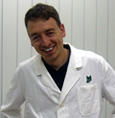PD Dr. med. vet. Sebastian Arlt

Fachbereich Veterinaermedizin
Tierklinik für Fortpflanzung
Provisional Director
veterinarian; Board certified by German College of Theriogenology; Dipl. ECAR small animal reproduction, Dipl. ECAR ruminant reproduction and herd health; qualification in Akupuncture; board member European Veterinary Society for Small Animal
Room 1.06
14163 Berlin
main research
- reproduction and obstetric of dogs and cats
- evidence based veterinary medicine
- since June 2016: board member European Veterinary Society for Small Animal Reproduction (EVSSAR)
consultation hours for reproduction in small animals
Small Animal Reproduction
Services for breeders of dogs and cats is an interesting and challenging field of veterinary medicine. Our research projects focus on relevant aspects of female and male fertility, parturition and neonatology. We aim to provide results that support veterinarians and breeders to offer better diagnostic tests and treatments. The projects follow interdisciplinary approaches in cooperation with scientists of different fields and also international networks such as the European Veterinary Society for Small Animal Reproduction (www.evssar.org)
Recent projects comprise
- Clinical study on the body temperature and other health parameters of puerperal bitches
- Clinical study on semen analyses with specific tests
- Clinical study on thyroid function in pregnant and lactating bitches
- Clinical study on metabolism and energy deficits in pregnant and lactating bitches
- Clinical study on applicability of GnRH implants in specific conditions in neutered dogs
- Development of an international database on treatments and treatment success of rare diseases such as ovarian cysts to enable multicenter data collection
Evidence-based Veterinary Medicine (EBVM) and Teaching
Important aspects of Evidence-based Veterinary Medicine are an effective transfer of knowledge from science to practice, informed clinical reasoning and a critical approach towards scientific information. We aim to teach critical reading and decision making with students and also postgraduates. To support this we have developed different checklists and other tools that support a reader to assess the quality of scientific papers and decide if information should be implemented into case management.
In addition, we conduct projects that aim to assess the learning success of different teaching methods. The results may support the development of new teaching strategies for the veterinary curriculum.
Recent projects comprise
- Development and assessment of a database for critically appraised topics (knowledge summaries, CATs)
- Systematic reviews of scientific literature on specific topics such as quality of literature on small animal surgery, internal medicine and reproduction
- Projects to implement and assess of wiki systems in teaching and veterinary practice (www.vetiepdia.org)
- Systematic literature review on inherited diseases in specific breeds (brachycephalic breeds)
- Comparison of learning success after listening to a lecture, reading information or writing a summary on specific topics
- Projects to train communication: communication with patient owners